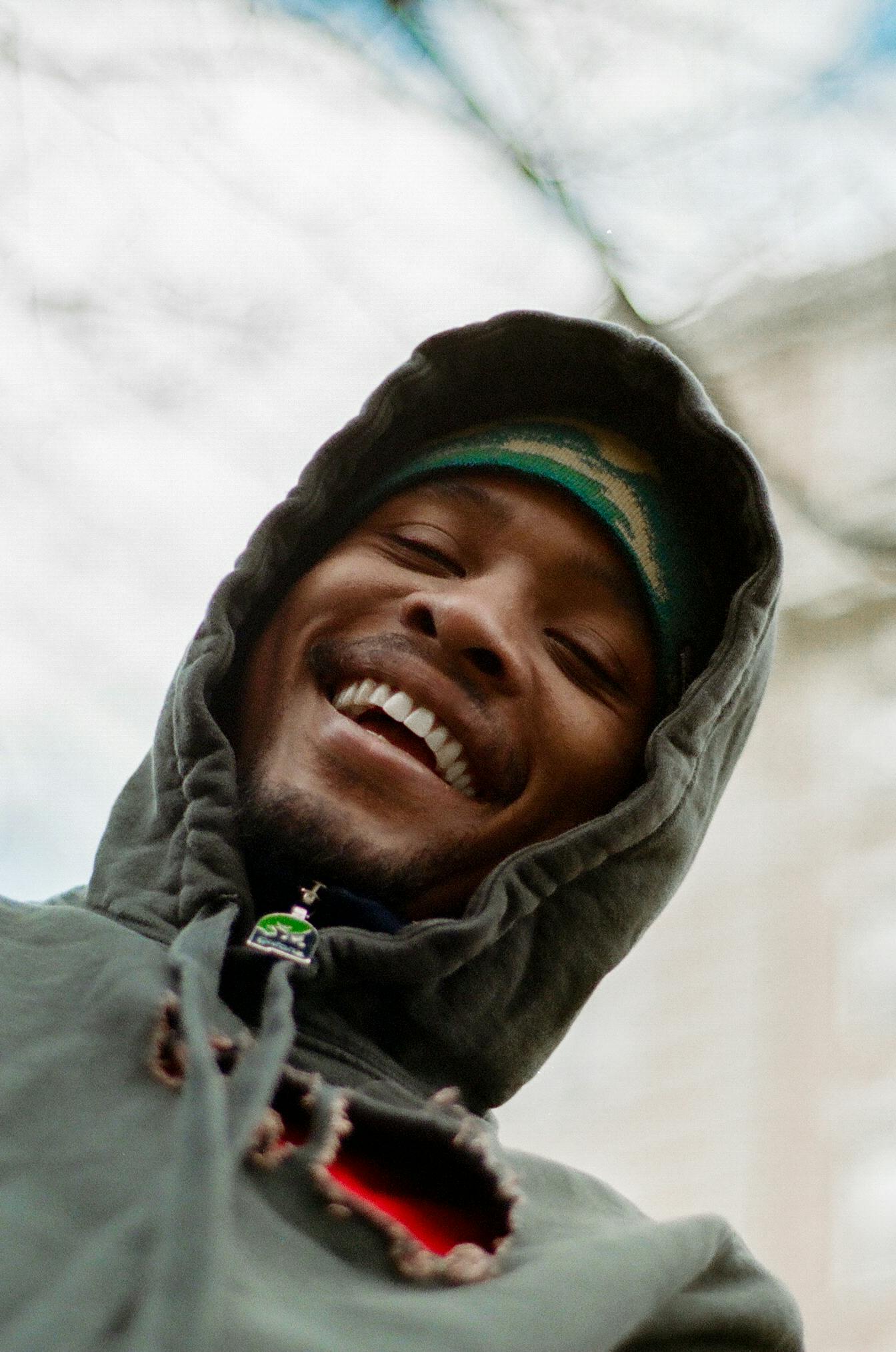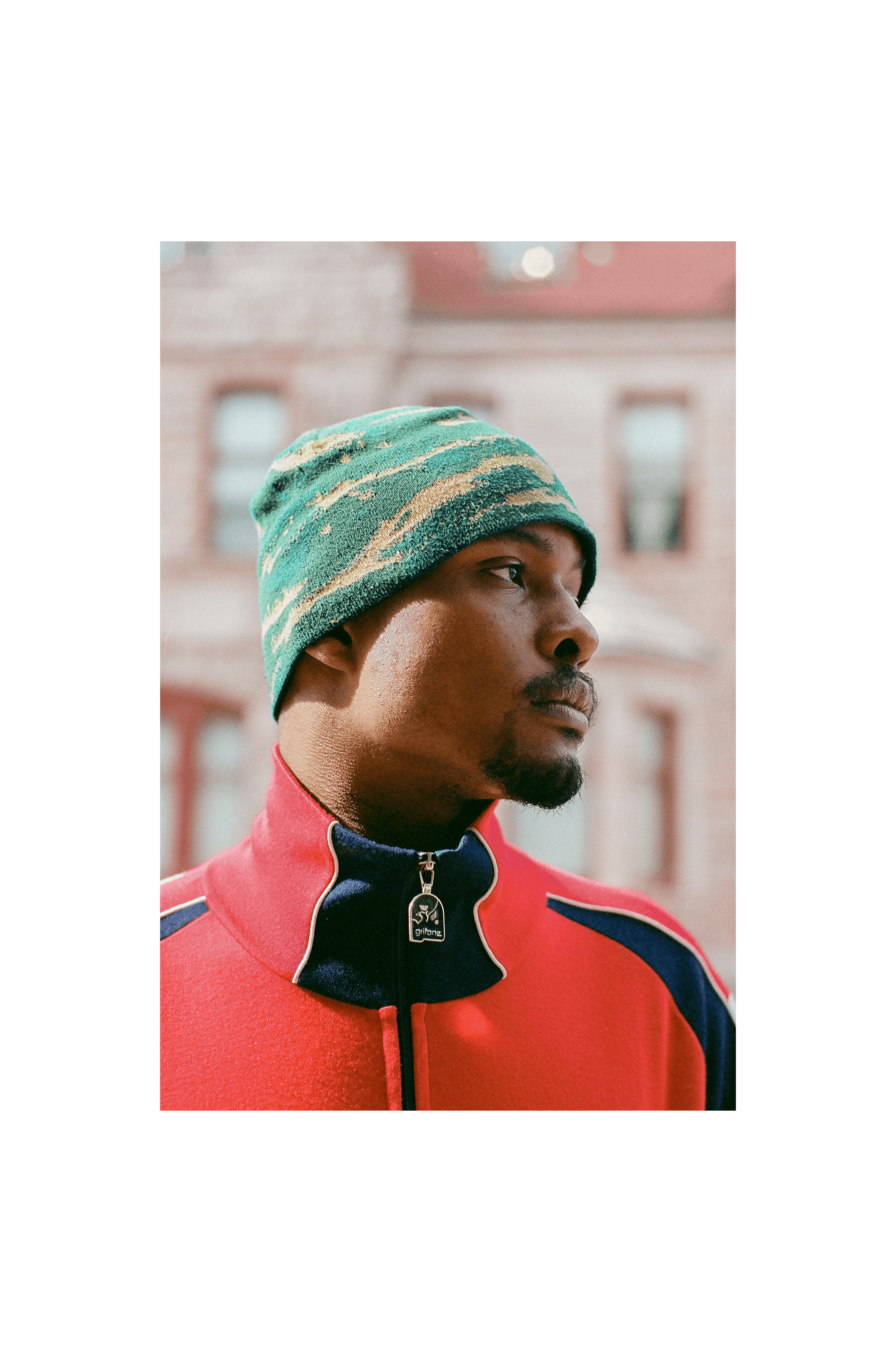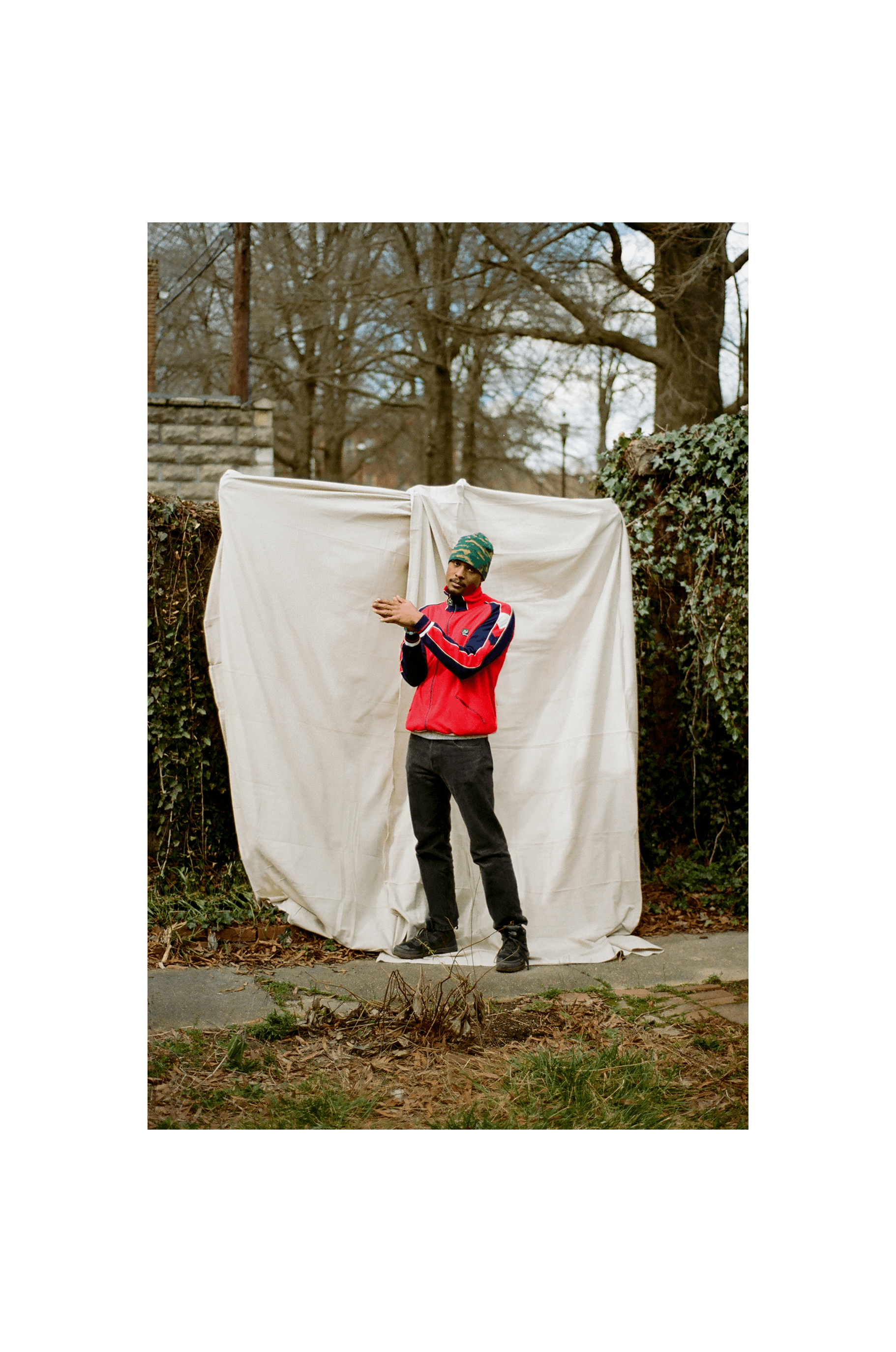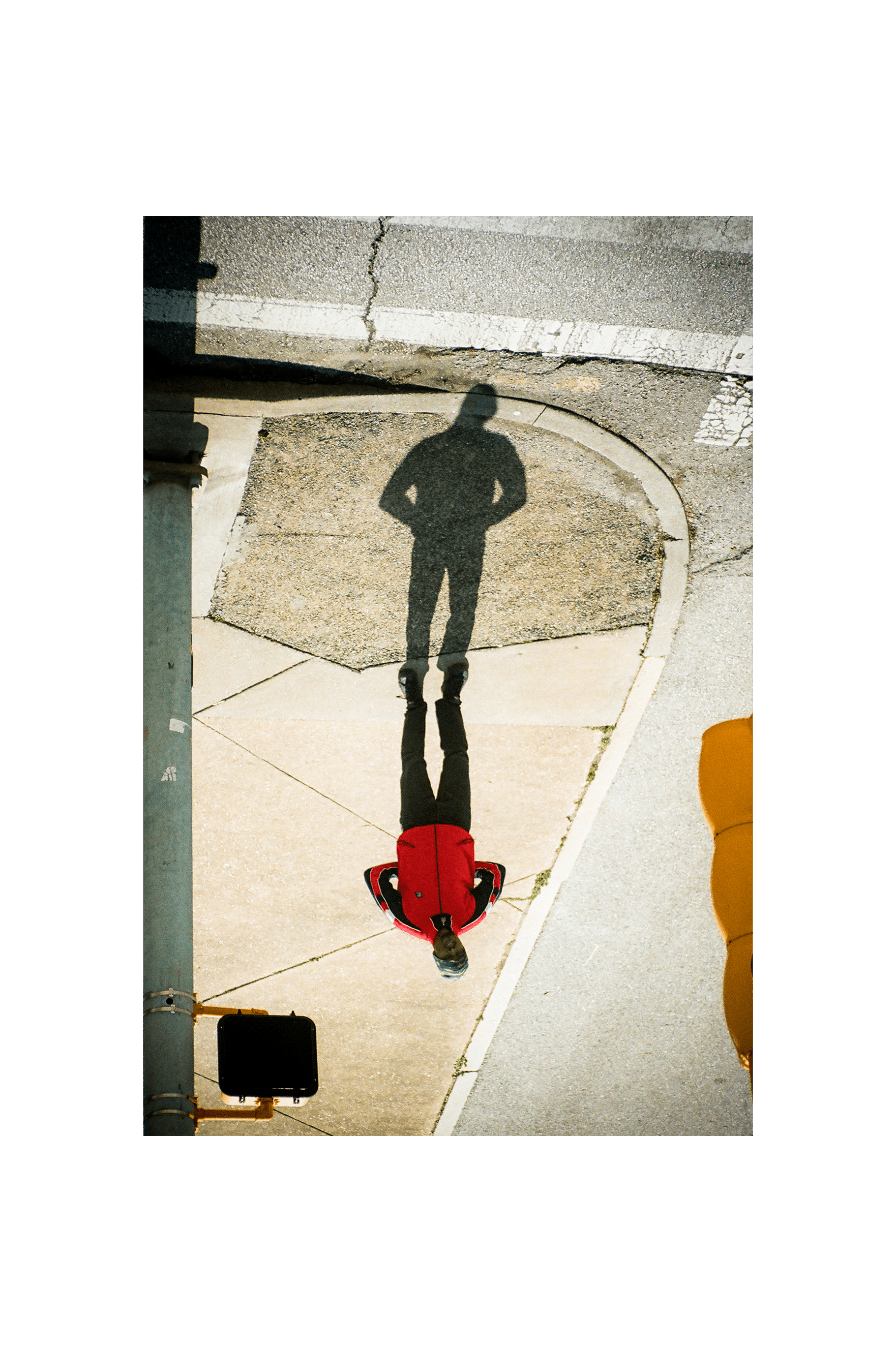
ECHOES OF REALITY: Nourished By Time's Musical Vision
Interview on 2/11/24 by Patrick No
Photography by Amira Green
In an office chair at his childhood residence, Marcus Brown, known as Nourished By Time, is casually sitting in his home studio. A place where he created his first album, where he learned guitar, where he evolved into the musician he is today. A Baltimore native, now touring the globe, is questioning his next steps… Do I move to NYC? London? For now, all he knows is that the Super Bowl is on national television this evening.
Being heralded on multiple media outlets as one of the top releases of the year with his album Erotic Probiotic 2, off of Scenic Route, I caught Marcus at a moment of bliss within his jam-packed life schedule. I spoke with Marcus about his time before he was a touring musician, his love for the Beatles, and why he enjoys London so much. His new EP off XL Records, Catching Chickens, is out now.


Patrick No: How are you? How was your weekend?
Marcus Brown: My weekend was pretty chill. Yeah, I went to a fish restaurant, got some sea bass, and chilled with my family. I'm going to watch the Super Bowl. I don't think it's going to be a good one.
PN: It’s in a couple of hours right?
MB: Yes, like 6, I think.
PN: I've heard that you're a Ravens fan, actually so...
MB: It’s a whole thing with Lamar Jackson. He went through this whole contract dispute with the Ravens. They didn't want to pay him, then he got paid. Now it's all good and we had a great season. It was supposed to end in a Super Bowl. We just got out the first round, but we were ranked first the whole season. I mean, he won MVP for the year, but just as a team, we have nothing to show for it.
PN: I want to talk about your time growing up in Baltimore. I always feel like whenever I talk to a musician or any artist, there's a moment in your youth, where something just clicks. It might be a family member putting you on to music, or a friend, co-worker, or teacher. Was there a moment when it clicked?
MB: I would say Baltimore was more of a dream state. A heavy “subconscious-like” time for me. I was there from where I was born until I was 17, which was when I left for college. I feel like that's when it clicked when I was in college. That's when I look back, and I'm like, "Damn, it kind of all came from my time in Baltimore." Baltimore definitely shaped my tastes and my sense of humor. I'm more dynamic because of it. I grew up pretty middle class, never really had too much or too little. I went to public school my whole life. So in Baltimore, that means you're meeting people like you, you know?
PN: It sounds like Baltimore and your time there has given your music a background, or story of your beginnings.

MB: More so in high school. In middle school, and when I was younger, I knew I liked music, but it was more so just like my iPod Shuffle and the radio. My dad got Sirius Radio.
PN: Hahaha. Sirius XM in the family car.
MB: Yeah, it was a big deal. My dad's a hip-hop purist. He stopped listening to hip-hop around the 90's. When it got too gangsta rap, he was like, "Nah." He still listened to Tribe Called Quest and De la Soul. But his guys were more Eric B & Rakim. Those were his guys, ya know? During my shows, I have this sampler that I use, sometimes with this Eric B & Rakim song called "Paid in Full." There's like a seven minute, long version. It has all these crazy, layers of samples. I found some of the samples and use them in my live shows.
PN: That's awesome, I love the throwback to childhood. Let's talk about the music scene in Baltimore. You have like, people like JPEGMafia, Beach House, and Animal Collective. You know, people like that, with a pretty wide range. Were you going to like DIY shows when you were younger in the city?
MB: No, honestly. I was a really sad, depressed kid that, like, never left the house. I didn't have a ton of friends. I would watch a lot of movies. Once I started playing guitar, That was all I did.
PN: When did you start playing guitar?
MB: I started playing guitar when I was 14 or 15. Yeah, being in the marching band was really social for me. With the marching band, we played at a lot of highschool football games and parades and stuff.
PN: What were you doing in the marching band? I did some research but I didn't know about this!
MB: I was in the marching band all four years. I was in all the bands, marching band, symphonic band, and jazz band. I played the bass drum in marching band; symphonic band, I played the trombone, and jazz band, I played the guitar. Jazz band was where I actually became a good guitar player. Before, I was just like playing power chords. I remember all these seventh chords and ninth chords thinking, "Oh shit, what the fuck is this? Damn, I think I might quit." Then I was like, "No, I'm gonna just learn it."
I was a really sad, depressed kid that, like, never left the house. I didn't have a ton of friends. I would watch a lot of movies. Once I started playing guitar, That was all I did.
PN: It seems like being in all those bands and having music opportunities in high school was super pivotal.
Yeah, I would say so. My first music teacher was the type of guy who, in his free time, would take out a saxophone and practice the Omnibook. He would let me skip class. As long as you were practicing something, he would let you stay there and hang out.
PN: What would you be practicing?
MB: Guitar. I'd be in the corner. Like with headphones, just as he's teaching some other class.
MB: The person who taught me how to play guitar was this dude named Charles Simon. He was a really, really, big Frank Zappa fan. From a guitar standpoint, the first music that I ever listened to was just a bunch of Frank Zappa.
PN: Oh, sweet! Was your guitar teacher a neighborhood friend or someone you found on the internet or something?
MB: This room used to be full of junk, now it's the studio, but my dad had a guitar laying down here. I would just come down here to hang out and chill, listen to music. Then, I would just play guitar... or like, fake play. I remember I popped one of his strings. When he found out, we went to a Music Go Round, and they just happened to offer lessons.


PN: So when you started to play guitar, it was like, classic rock stuff?
MB: Red Hot Chili Peppers, Funkadelic. The stuff I wanted to play was more like Stone Temple Pilots, Soundgarden, and Nirvana—a lot of Nirvana. There's just a joke I always have that when you play guitar, you're transported into 1969.
PN: I've been told that when you were younger, you listened to bands like Oasis and the Cure and stuff. Were you in the corner listening to The Cure trying to replicate those songs?
MB: I was probably trying to read music, which was really important to me at the time.
PN: Or were you in the corner listening to All American Rejects hahaha.
MB: You know what? I would be on Wikipedia sometimes, reading about the Beatles. I was obsessed with the Beatles around that time, like obsessed. I was really big into listening to music and reading about it at the same time.
PN: I like doing that too. I like to go on Wikipedia or just Discogs or something.
MB: No, exactly! Exactly. I think Magical Mystery Tour is one of my favorite Beatles albums.
PN: I'm a Sgt. Pepper's guy.
MB: The White Album too. I used to be a big Rubber Soul guy too. My first girlfriend broke up with me and I remember listening to "In My Life" just over and over and over...
PN: Hahaha. On repeat for three days straight.
MB: Like, I'm gonna fuckin' rinse this shit.
PN: Let's fast forward to Berklee. What can you say about your time there? Did you have a good experience there or...?
MB: It was kind of different for me. I had only been playing guitar for two years at the time. Everyone else there had been playing for a really long time and had this whole identity of being a musician from being a really young person.
PN: It sounds pretty scary or intimidating; Walking into a classroom and you're like, "Oh, shit. These people have been playing piano since they were six!"
MB: Brooo. I know. Exactly. I think the biggest thing I took away from Berklee was that like your skill is really important, but it's not as important as your taste. Most people don't really have great taste. Also, most people don't really think for themselves. When I was in those classes, I was on my own weird fucking journey. I wasn't really there to appease the teachers, compared to where a lot of students have this, "Am I doing it right?" mentality. That might work for like science, math, or something more academic but for music, it's very subjective.
PN: There's no like, right, you know?
MB: There's no right! That school was very out of touch when I was there. I don't know what they're doing now, but there wasn't even a rap class when I was there. When I was there, the kids were just figuring out who D'Angelo was. They had just discovered Untitled (How Does It Feel) or Voodoo, and Brown Sugar. That was the music my mom was driving me to school to when I was a kid. It was this weird, gentrification of the music I loved and cherished.


I think the biggest thing I took away from Berklee was that your skill is really important, but it's not as important as your taste.
PN: It's crazy to think that a school that probably has an endowment of about $100 million doesn't have a class about rap or R&B or something like that.
MB: Yeah, I won't trash them too much. I don't really talk about them too much, because I don't want to give them any more free promotion. Overall, it was good. For me, it was good.
PN: That's nice to hear. I'm happy that it was good. So a lot of people describe your sound as post r&b, or experimental pop with hints of hip-hop.
MB: I came up with post r&b because I think I like that more.
PN: Yeah, it feels like a term that doesn't get thrown around that much.
MB: I think it applies to other artists, like Frank Ocean. I understand the need to market or categorize something. It's all for marketing. The problem with marketing is it's attached to like, how we are as people. There can be sexist, racist, or homophobic tones to how we market or categorize something. If I were white, I don't know if I'd be called r&b. James Blake is not often called r&b. To me, he is... r&b mixed with other shit. I am heavily influenced by r&b music. I'm also just as much influenced by the Pixies, or Ian Curtis, or Cibo Matto. Even like, jazz too.
PN: Your breakout album, Erotic Probiotic 2, has been featured in a handful of Best of 2023 lists. That's a pretty hard feat for anyone, congratulations. I also saw that you describe the budget for that album as $0. Tell me about the major differences from pre-, you know, EP, to, post EP.
MB: Before the album came out, I was on tour with Dry Cleaning. So like, things were starting to happen. People were slowly starting to know who I was. I was seen more as a punk artist... I don't know, it seemed like people didn't really know what I was. I was getting more compared to Dean Blunt, who I really love. I was still living at home and working a bunch of jobs. I just stopped working retail. I was like, this is a trap.
PN: I heard that you worked at Whole Foods for a little bit.
MB: Yeah, I worked at Whole Foods. That was my last retail job. It was the worst job I've ever had. It was like in the middle of COVID, and it was like across the street from this banking or financial building. They would come over for lunch and spend my whole paycheck just like that.
PN: It's so crazy when you see someone at a restaurant or bar, or even at the grocery store spend like $700. You're just like, "Literally how..."
MB: There were a bunch of sobering moments like that. By the time my EP came out, I was doing video work for construction workers, like safety videos and shit. I would just, like, set up a camera. I just had to drive to DC more, but it was cool. It definitely helped out.
PN: So post Erotic Probiotic 2. When did you start seeing the major life changes?
MB: It was definitely after Pitchfork gave me Best New Music. It was just a bigger bomb, that's when people took me more seriously. People who knew me started to take me more seriously. After the album came out, it was just like, "Oh!" I did the Pitchfork Rising piece with Julian Escobedo Shepherd. Being on Yaeji's album was a big deal. Being able to work with Dry Cleaning and all these other artists. I would say post EP2, it's life has been really fun. In my head, I've always been even bigger than this. I know what I'm capable of. It also comes from from being an athlete. I know how, like, you get better at things.
PN: You push yourself, and you'll get stronger.



MB: And being being honest with yourself. Being honest with your strengths and with your weaknesses. Knowing where your blind spots are. Knowing like, "Okay, I need to call for help. I need to pass the ball." I'm still very competitive, but I try to internalize it.
PN: When someone might listen to Erotic Probiotic they might not see a lot of the overarching themes. Your lyrics talked about a relationship, depression, race inequality, capitalist America…
MB: Staring into the Fireplace is one of my favorite songs ever. It's definitely my favorite song to play live. I can get really deep into this leftist shit. And just some of the depressing parts of humanity and the world; also about how other people don't seem to really care sometimes. I think I'm at this point where I'm trying to be more positive in general, but still have that intensity. It's like a trap, you know? People start to acquiesce and say, "That's how it is," because they just want to feel better about themselves.
MB: Back to your previous questions. In the process of writing these albums, I've had a lot more anarchist friends. I used to work at a barbershop. Everyone there was an ex-con or like recovering drug addict or... something so relatable. You would never really know unless they told you, you know. Myself going through similar things and having family members go through similar things. Also, seeing how the consciousness of the world is realizing that everyone is kind of going through the same shit. We're divided by class and status, and all these imaginary things that aren't physical because we need to be controlled. I'm trying to use whatever new power or new attention that I have right now for good. I remember the first time I saw a postcard of Basquiat. I was at a bookstore and thought, "Oh, who is that? That looks cool." I remember when I looked him up, and I was like, "Oh, damn, he is cool." That's what I want to be for myself in another dimension.
PN: Having a young kid pick up your EP in the same way that you picked up that postcard.
MB: Yeah, if I influence anyone else, that's like the dopest shit in the world. I'd be very grateful.
PN: Let's chat about your new EP on XL Records, Catching Chickens. I love the intro song, Hell of a Ride.
MB: I think it's really good! I was talking to Richard Russell and he said, "Yeah, sounds like you're doing like a victory lap." The production is big and sounds definitely victory lap-ish, very triumphant, but the lyrics aren't. It's talking about still being hung up on your ex-girlfriend, not being able to eat unless you're high. Other verses about children being poisoned, and, not having a third place. To be honest, the song Hell of a Ride is about wanting to get the fuck out of America. Laughs. I like to have a nice theme song.
PN: Tell me about your international travels out on your Euro tour. Did you ever think you'd be going to like, Estonia?
MB: Yeah. Laughs. Only because I know me and I know how random I can be. Nah, but no. I didn't really know where it was until they asked me to come so I was like...
PN: Oh, we're going over theeeere...
MB: I was like ohhh dope, dope, dope. That was probably my favorite show. Everyone there was so nice, the venue Uus Laine is really cool, the promoters were so sweet. They like met me at the airport and, I don't know, it was just like, a really good vibe. And I would definitely go back.
I'm trying to use whatever new power or new attention that I have right now for good.

PN: How was London?
MB: It's always great. I would move there. I'd rather move there than NYC.
PN: What's in the water in London?
MB: The people in London probably wouldn't feel this way, but London just feels more open to different music.
PN: I completely agree.
MB: Yeah, I went to the ICA. I just always see the dopest performances and shows when I go there.
PN: London has always been really good at making fantastic music, but especially in the past five years. I'd say there's just been like an explosion.
MB: No, yeah. I was talking to Richard Russell, and he said, "London constantly recreates itself. Every, like, three years." I just feel really good when I'm over there. I feel like I have a nice community there now. I have places to sleep and friends there. It's also where everything started. My first Nourished By Time show was at Servant Jazz Quarters in Dalston.
PN: I think you love London. That's awesome.
PN: What are what are some of the major differences from making a project on XL vs. prior releases?
MB: Catching Chickens was already done by the time XL picked it up. I would say for the EP, I got to work with a team now, which is really exciting. They're all really supportive. I'm so used to doing everything myself, so it's nice to just not have to worry about that too much.
PN: Has it been a dream to work with a group of people in a studio environment?
MB: People I trust. They get my vision, they get what I'm trying to do, they get how I work.
PN: That seems really exciting to hop in the studio and you feel like everyone is on the same page as you.
MB: Yeah, no, exactly. They will be as hands-on or hands-off as I want them to be. For the next album, I have most of the music recorded. I'm going back and fine-tuning certain things. I've been working with Anthony Naples on the next album.
MB: He's been helping me record everything, mostly acting as an engineer. We've been talking a bunch, and I've just been learning a lot from him. He's been this mentor figure that I've always wanted to have. For my next album, I think I'm trying to balance staying in my comfort zone and also elevating things to the next level.
PN: What do you define as your comfort zone?
MB: Me being in a room, doing everything. Not getting other people to sing on records and not pushing my imagination as far as it can go. I feel like before I would always have these blocks. "Oh, man, I don't know how to do this because I can't. I don't have the money. I don't have you know, this or that." Those just excuses. Now, I have no excuses.
